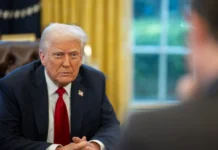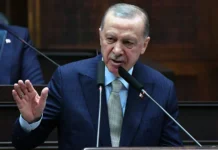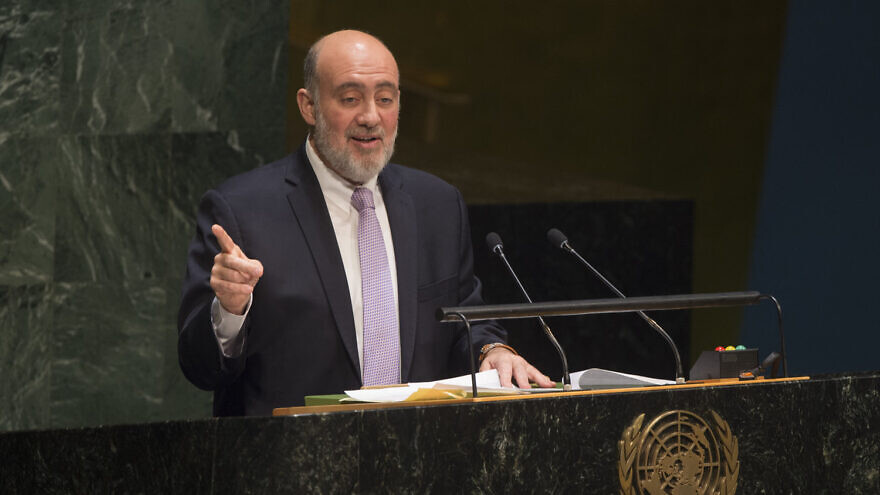It was during Operation Cast Lead in December 2008. The Israeli Embassy in Britain was surrounded by demonstrators, some of whom became violent. They climbed the fence, threw firebombs and rocks. Tension was running so high that Yuval Diskin, then-head of the Israel Security Agency, which is in charge of security at Israel’s embassies and consulates abroad, recommended closing all diplomatic missions to keep their staffs safe.
Ron Prosor, who was serving as Israeli Ambassador to Britain at the time, rejected the idea.
In the book, Prosor sums up 30 years spent at the heart of Israeli diplomacy. From the secret contacts he helped build with the Gulf states to dealing with the global media in London and the ceaseless struggle against the U.N.’s hypocrisy and triple standards. The book includes many anecdotes, including one time when Prosor noticed an unusually unattractive woman sitting next to him on a flight. On second glance, it turned out that “she” was none other than then-Mossad head Meir Dagan.
A: Every system, certainly a political one, needs to undergo change from time to time and bring in new people who will espouse a new approach and new possibilities. The new blood now in power here, and the refreshing approach of the government and its leader, are giving them opportunities to tighten the bonds between Jerusalem and Washington and pave a new way forward for the two countries.
We need to take a lot more intensive action when it comes to the Black and Hispanic communities, and the entire progressive public in the U.S. in general. We need to invest in that. It’s a battle. We have something to say and we can and should present our positions. I think that more can be done to stop this wave.”
Q: Do you support criticism of Netanyahu and Ron Dermer, who was ambassador to the U.S. while Netanyahu was prime minister, when it comes to losing Democratic support?
A: First of all, it must be said that there are many Democrats who support us. True, there are some who don’t, but they’re still a minority, even if they’re a vocal one. The role of a prime minister is to form an intimate relationship with U.S. presidents. Ties like these existed in the past, even when there were disagreements. So I think that better work should have been done with the Democrats, and they [Netanyahu and Dermer] bear some of the responsibility. But as I say in the book, this doesn’t detract from Dermer’s historic successes as ambassador, first and foremost the relocation of the U.S. Embassy to Jerusalem and the Abraham Accords. He is one of the most knowledgeable people about Israel-U.S. relations in the diplomatic service, and he has paid a personal price more than once for his total loyalty to Netanyahu.
The Gaza disengagement and its lessons
Prosor, the son of a diplomat, grew up in the foreign service. In his last diplomatic posting, he served as Israeli ambassador to the United Nations from 2011-2015. Prior to that, his career took him to Britain, Washington and Switzerland. He experienced first-hand historic processes and events such as secret meetings with Arab leaders, or the evacuation of the Israeli Embassy in Washington on Sept. 11, 2001.
He was in the room when the 2005 disengagement from the Gaza Strip was implemented.
“The idea was for the Palestinians to take charge of their own fate,” he said. “Our assumptions did not live up to reality. We were mistaken when we assumed that the Arab states would want to help build Gaza, or when we hoped that the Palestinians would seize the opportunity to develop Gaza. We were wrong when we thought that Palestinians public would appreciate a voluntary withdrawal, from a position of power. For Hamas, the Israeli move was a retreat of weakness that confirmed that they could and should continue their violent ways.”
Prosor also had his eyes opened about supposedly enlightened European countries.
“We thought that the nations of the world would look favorably on the Israeli step and change to some degree their anti-Israel paradigm. So we thought,” he said.
His disappointment with western democracies that supposedly embrace liberal values is the main message of the book.
“The international community doesn’t have a double standard, it has a triple one. One for most countries in the world that aren’t democratic, from which nothing is expected. The second for the democracies. But Israel is held up to a third and special standard. It’s a unique demand, one that is so high it can’t be met,” he said.
Q: For example?
A: If rockets are fired at Israel, they say Israel has the right to defend itself. But then they don’t really allow you to strike at the terrorists. You do everything with one hand tied behind your back, with a threat hovering overhead that your soldiers and officers will be arrested if they leave the country. Or take Hezbollah’s tunnels—a clear violation of U.N. Security Council resolutions, but the UNSC is silent.
Or UNIFIL, who are in Lebanon on behalf of the U.N. and regularly report Israeli flights in Lebanese airspace. But like the three monkeys, they never [see, hear or mention] even a single one of Hezbollah’s ceasefire violations. I can give you a long list of things that are just unbelievable, that only Israel is subject to.
[…]
There are three layers [to this phenomenon]. The first layer is latent, inherent anti-Semitism. That’s part of Europe’s DNA. The second layer is the double guilt complex. Some of the system is flagellating itself for what it did to the Jews in the Holocaust, and about colonialism. Europe projects these guilty feelings on Israel. The third layer has to do with discrepancies of perception. Like Europe, Israel embraces democratic, pluralistic ideals. But when it comes to the nation state, which Israel supports and the Europeans have reservations about, there is a clash. There is also a clash about the values of individual liberty and national security.
When UNESCO votes in favor of a resolution declaring that the Jewish people has no ties to the Western Wall and the Old City of Jerusalem—it’s simply inconceivable.
Q: While you were at the U.N. you refused to accept the situation.
A: Right. When I realized what was happening in that arena, my instructions to the mission were clear. We were not going to leave any attack unanswered. The time was over when the Israeli diplomat would note down what was said in the meeting and report it to Jerusalem. I demanded that everyone respond on the spot, and go on the offensive. With wit, with sarcasm, but to make them pay a price—and if possible, do so in the language of a nation attacking us. We had several of Arabic speakers in the mission, and they embarrassed Saudi Arabia, Qatar and Syria, as well as other Arab countries, more than once.
Q: When it comes to Arab countries, you argue in the book that there is no peace between Israel and Jordan or Egypt.
A: I define our relations with those two countries as a state of non-military fighting. Of course, there are security ties, and they are very important. But what is needed there—[and]which is the basis for our relations with the Gulf countries—is contact between the peoples, interpersonal contact. Tourism, academia, youth exchanges, business. This is all a fabric that needs to be woven over time.”
Q: Jordan and Egypt aren’t interested.
A: A way must be found so it’s worth their while. We can’t give up.
Q: Why does national honor matter?
A: We tend to ascribe patriotic significance to that concept, but national honor has both domestic and foreign significance. When you apologize for a just act, like stopping the [2010 Mavi] Marmara flotilla for example, what message does that send to the soldiers and commanders who fought there? In international terms, what people remember is, “Israel apologized.”
Q: [Then-U.S. President Barack] Obama demanded the apology.
A: In hindsight, I think that Israel shouldn’t have apologized.
This article first appeared in Israel Hayom.


























